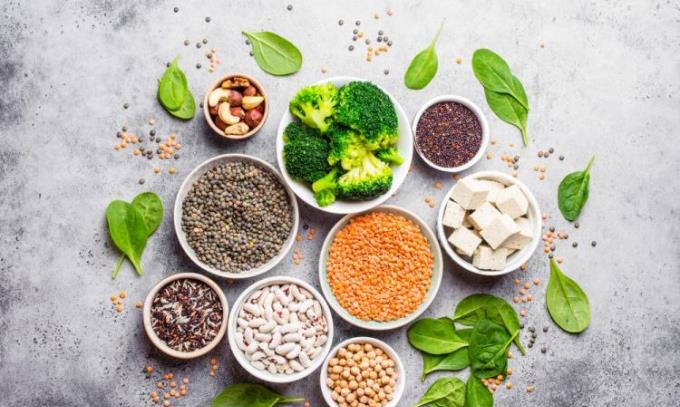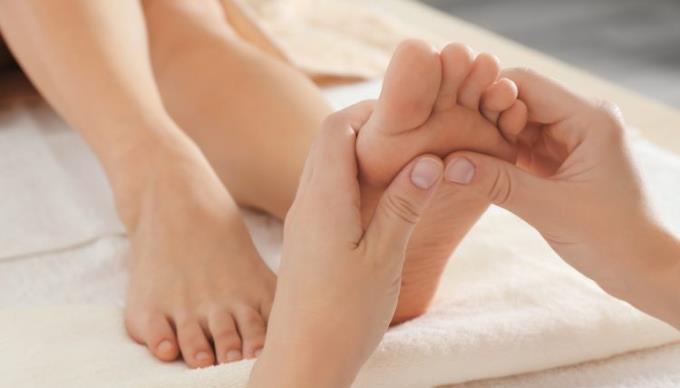Pregnant women with calf cramps at night may startle while sleeping with stiff and numb pain in the calves, feet or both. So the cause and treatment of calf cramps in pregnant women is what?
Calf cramps (cramps) are one of the many body changes that occur in the second and third trimesters. Nearly half of pregnant women experience calf cramps in their third trimester . Many pregnant women often experience leg cramps after sitting in one place for too long or having calf cramps while sleeping.
You may not be able to completely prevent calf cramps, but there are some solutions that can help with soreness. If you know the causes of the cramps and how to treat them, you will experience a milder pregnancy.
Causes of calf cramps in pregnant women

Let's learn about the causes of cramps in pregnant women to find out how to alleviate this unpleasant symptom.
1. The body gains weight
The pressure from the growing baby every day can damage the nervous system and blood vessels going to the pregnant mother's feet. The situation that pregnant mothers gain too much weight is also one of the causes of cramps when sleeping, especially in the third trimester.
During the last months of pregnancy, the calves become more tired as the weight increases more. Pregnant mothers can increase 10–20 kg compared to the period before pregnancy. In which, the weight of the fetus accounts for about 3.5 kg. Amniotic fluid, placenta, fluid and blood will account for about 3.5–5.5 kg.
Excess weight gain not only makes pregnant women have calf cramps, but also has the risk of hypertension, preeclampsia , premature birth, difficult birth ... Most pregnant women are overweight or obese before pregnancy. gain more weight than necessary.
2. Dehydration
If your urine is dark yellow, this means your body is dehydrated. In addition, you may also experience some other signs of dehydration such as peeling lips, rough skin, bad breath, craving for sweets, headache, calf cramps ...
When dehydrated, your body cannot cool itself as it should. The hotter the body temperature, the more susceptible it is to cramps due to the heat effect on the muscles. As the muscles work harder and produce more heat, the more likely it is that pregnant women have calf cramps.
The phenomenon of hot flashes during pregnancy because pregnant mothers need a lot of energy for the development of the fetus also makes the body easily dehydrated. In addition, some pregnant mothers who work or live in a hot environment also have a high temperature increase.
3. Nutritional deficiencies

A lack of calcium or magnesium in a diet can put pregnant women at risk of calf cramps. These are important nutritional ingredients to help pregnant mothers stay healthy and babies develop comprehensively.
When you are pregnant, the fetus needs calcium for strong bones and teeth, developing heart, perfecting nerves, helping healthy muscles, regulating heart rate ... If you do not add calcium to the necessary amount, you Your baby will take calcium from your bones, leading to weaker health in the future.
However, if you have taken enough calcium for pregnant women, this is not necessarily the cause of leg cramps in pregnant women. A 2015 study examining 390 pregnant women found that calcium or magnesium supplements made very little difference in calf cramps.
4. Slow blood circulation
When a woman is pregnant, the blood circulation process slows down. This is completely normal, so there is no need to worry. This is partly due to the overactive hormones.
During the last months of pregnancy, the mother's body also undergoes an increase in blood volume. This condition also contributes to slow blood circulation and can cause calf cramps in pregnant women.
Apart from slow blood circulation problems, pregnant mother also has the possibility of blood clots or thrombosis deep vein DVT (deep vein thrombosis) in the legs, thighs or pelvis. According to NCBI , pregnant mothers are 5 to 10 times more likely to develop DVT than non-pregnant women.
5. Habit of sitting a lot
Feeling tired every time you move, so you just like to sit still? The habit of sitting a lot due to heavy body or office work can be the reason why pregnant women have calf cramps!
Sitting in one sitting can slow blood flow, and increase the risk of DVT deep vein thrombosis. Not to mention, pregnant mothers are also very easy to gain weight if they are inactive. These are all potential factors that lead to calf cramps.
Not only is it one of the causes of calf cramps, the habit of sitting for many consecutive hours is also a habit that harms the spine and many other health risks. There are even studies that have warned this bad habit can reduce longevity.
How to treat calf cramps for pregnant women

Pregnant women who often have leg cramps are afraid of the sudden spasticity and numb pain. If you have calf cramps when you sleep at night, pregnant mothers will feel tired from not getting enough sleep . The case of leg cramps during the day is even more dangerous if the mother is driving traffic or up and down stairs.
To minimize the unpleasant experience and ensure safety during pregnancy, you can apply the following calf cramps treatment for pregnant women.
1. Maintain a reasonable weight
If pregnant mothers gain healthy weight , not only will the baby grow well but mothers also reduce the risk of calf cramps. To find out the right weight for your pregnancy, you can rely on your pre-pregnancy BMI :

A reasonable goal of gaining weight during pregnancy will help you build a healthier diet and exercise routine.
2. Drink plenty of water every day
The recommended daily intake of water is about 2.5 liters for women. However, the diet is also full of water-rich foods (about 1/5 of the recommended amount of water), so you only need to drink 9–12 glasses of extra water.
Don't wait until you are thirsty to drink, you can stay hydrated whenever you remember. In addition to filtered water, you can also supplement water from fruit and vegetable juices to both increase the taste and add many vitamins good for pregnant mothers.
3. Essential nutrition supplement
How to treat cramps for pregnant women can simply be adding calcium from daily foods or functional products as prescribed by your doctor. Along with iron and folic acid, calcium is one of the essential ingredients in the diet for pregnant women . Pregnant women need 1,000mg calcium / day or more if they are deficient.
Pregnant mothers can add to the menu the following calcium-rich foods :
Cheese, yogurt, fresh milk, gourd milk
Types of seafood (fish, shrimp, crab, crab ...)
Dark green vegetables (spinach, kale ...)
4. Regularly massage the feet

If you know how to massage the legs , pregnant mothers not only minimize cramps and edema but also relax the spirit very well. You can massage in the morning after exercise or in the evening before bed.
When you massage your feet, you can sit on a low chair or on a bed that feels most comfortable. You can apply massage oil and start the massage from foot to leg for 10–15 minutes. Regular massage routine will help pregnant mothers to circulate blood in their legs, thereby reducing cramps and pain.
5. Light physical exercise
Pregnant women with calf cramps can exercise gently with exercises such as walking, swimming, yoga ... If you want to improve your health and avoid aches and pains, do not sit for more than 30 minutes a day .
Pregnant mothers can also perform leg muscle stretching exercises in the evening before bed. Stand at arm's length from a wall and do the following:
Place your hands on the wall in front of you and move your right foot behind your left foot.
Slowly stretch your left leg forward, keeping your right knee and right heel straight on the floor.
Hold the stretching position for about 30 seconds, carefully keeping your back and hips straight forward.
Be careful not to rotate your legs inward or out. After stretching your left leg, switch legs and repeat.
Along with the treatment of calf cramps in pregnant women, you should also pay attention to choosing comfortable clothes and shoes to make blood circulation easier. During the day, you should not sit cross-legged. At night, remember to rest your feet on a high pillow. If you have cramps, straighten your legs, bring your heels forward, and wiggle your toes. Ask your husband to gently massage his legs to relax.
Pregnant women with calf cramps will go away on their own after giving birth. However, you should see your doctor if you are experiencing other unusual signs such as swelling, pain, redness, or burning that doesn't go away.
In fact, it is difficult for you to accurately predict the cause of calf cramps in pregnant women to have a corresponding solution. These calf cramps may only help improve pain or reduce the frequency of repetition, not stop it. However, these are also simple tips to help pregnant mothers less tired during pregnancy!
















